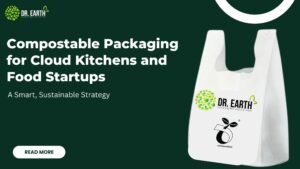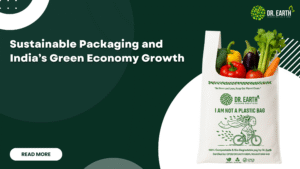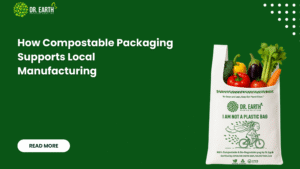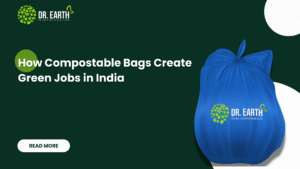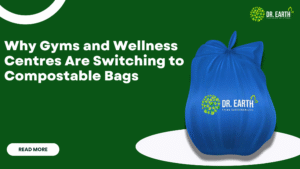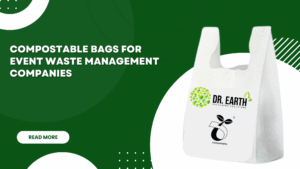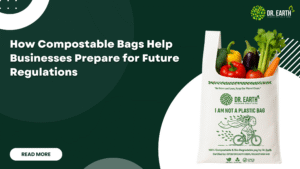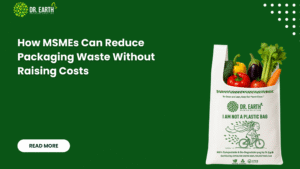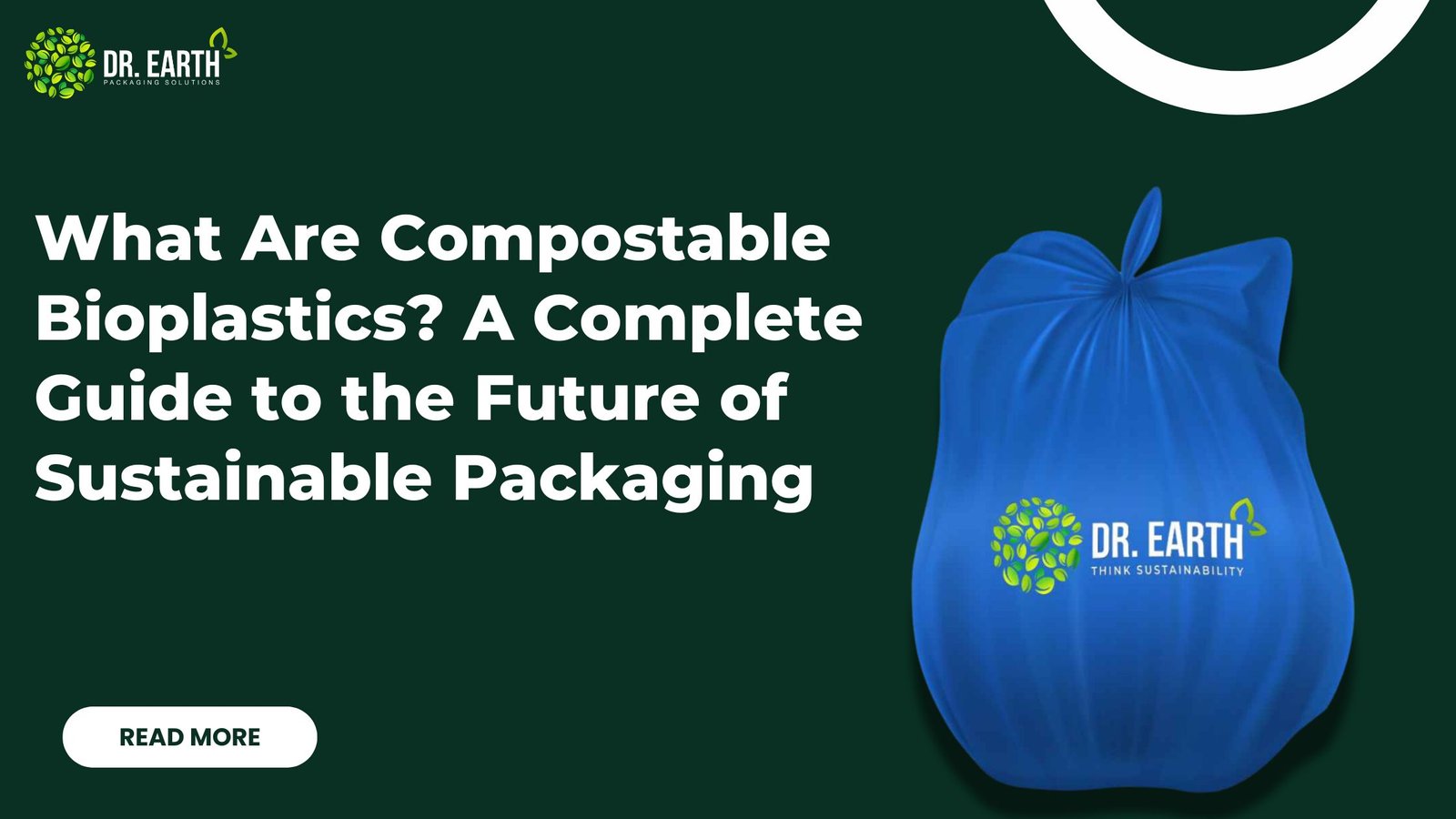
As the world continues to deal with the increasing concern regarding plastic pollution, finding eco-friendly alternatives may be a matter of urgency. One of the most interesting innovations being talked about by scientists, manufacturers, businesses, and environmentally concerned consumers is compostable bioplastic. But what are compostable bioplastics you ask? How do they differ from traditional plastics, or even regular bioplastics? Why should we care?
This detailed blog goes through the basics of what compostable bioplastics are, their benefits, known applications, recognition of their environmental impact, and companies like Dr. Earth, a reported manufacturer of biodegradable and compostable products in India.
Understanding the Basics: What Are Compostable Bioplastics?
Compostable bioplastics are plastics made from natural, renewable materials—the majority come from corn starch, sugarcane or potato starch – which decompose in an appropriate composting environment into water, carbon dioxide, and organic material that is not toxic to the organic compost pile itself.
With traditional plastics which come from petroleum products and can take hundreds of years to degrade, compostable bioplastics go from the compost pile to a broken-down compostable product in a matter of months after going into a composting environment. There are no microplastics, nor toxins, nor residues remaining.
Bioplastic vs. Compostable Bioplastic
Importantly, not all bioplastics can be composted, and while bioplastics may be derived from natural sources, the end results are still petrochemical plastics in regard to degradation. Compostable bioplastics are derived from natural sources intended to degrade in certain environmental conditions, often with certification from the Central Pollution Control Board (CPCB) in India.
How Are Compostable Bioplastics Made?
The basic format for the production of compostable bioplastics is as follows:
- Raw materials are obtained – This can be in the form of cornstarch, sugarcane bagasse, or cassava.
- Fermentation – The raw materials undergo microbial fermentation producing substances such as, polylactic acid (PLA).
- Polymerization- The “bio” compounds are then polymerized to be boom-like products.
- Processing- These bioplastic products can then be molded, extruded, or blown into carry bags, garbage bags, cutlery, and food packaging (i.e., boxes).
The process is dramatically lower in carbon footprint than traditional plastic production.
Key Benefits of Compostable Bioplastics
1. Environmentally Friendly
Compostable bioplastics naturally break down, which provides less waste in landfills, and minimizes the emission of damaging greenhouse gases.
2. Safe for Food Contact
Certified compostable bioplastics are safe for use/containerization of food items. Traditional plastics may leach chemicals.
3. Made from Renewable Resources
The inclusion of corn, sugarcane and other resources as raw materials means the finished plastic have greatly improved ecological footprint.
4. Supports Waste Management Goals
Compostable bioplastics are processed as part of organic material, therefore it is relevant for communities, restaurants, supermarkets and commercial kitchens.
5. Regulatory Compliance
In India, using compostable plastics approved by the CPCB will help ensure that your business is compliant for single use plastic bans and waste disposal regulations.
Real-World Applications of Compostable Bioplastics
Compostable bioplastics are being used in a variety of applications in numerous industries.
- Retail: Compostable carry bags
- Food: Cutlery, containers, garbage liners
- Agriculture: Mulch films, potting for seedlings
- Medical: Disposable items, gloves and syringe covers
- Packaging: Wrappers, bubble wrap, product containers
Their adaptability and safety make them ideal for everyday use in both personal and commercial settings.
Dr Earth: Leading the Way in Compostable Bioplastic Products
Dr Earth is one of the leading manufacturers of compostable products in India. They specialize in:
- Compostable garbage bags
- Compostable grocery bags and carry bags
- Custom eco-packaging solutions
All their products are made from corn-starch based bioplastics, are 100% biodegradable, and are certified CPCB approved, they will decompose within 90 to 180 days with composting conditions. They are environmentally safe for people and animals alike.
By purchasing straight from www.drearth.co.in you and your business are making strides towards reducing your plastic footprint.
Common Misconceptions About Compostable Bioplastics
1. They Decompose Anywhere Instantly
Not correct. Compostable bioplastics require certain conditions to decompose; heat, moisture, and microbial activity. They will not decompose in regular trash or dry land fill conditions.
2. All Bioplastics Are Compostable
As mentioned earlier, even if the bioplastic is bio-based, it may not be compostable. Always check for certifying bodies.
3. They Are Too Expensive
Yes, compostable products may cost a little bit more than their plastic counterparts, but by buying in bulk, volume production is expected to decrease costs, along with their increase demand. The environmental savings will also help.
4. They’re Not Strong Enough
The modern compostable bags and products are less likely to rip, leak, or tear than the alternatives. They are waterproof, durable, and designed to be strong enough for daily, recycled use.
5. They Can Be Recycled
Compostable bioplastics aren’t designed to fit into a plastic recycling process so they must not go into recycling, but into a composting facility.
Certifications and Standards to Look For
In India, the central authority for certification of compostable plastics is the Central Pollution Control Board (CPCB). Some international standards include:
- ASTM D6400 (USA)
- EN 13432 (Europe)
- ISO 17088 (International)
Dr. Earth products come with CPCB approval, which means they have passed stringent biodegradability and compostability standards.
How to Properly Dispose of Compostable Bioplastics
For compostable bioplastics to deliver on their promise to the environment, proper disposal is paramount:
- Separating Compostable Waste: Do not co-mingle with regular plastics.
- Composting: If available, use industrial composting, but home composting will successfully accommodate bags and certain other items.
- Label Awareness: Making staff and customers aware of compostable waste bins as opposed to landfill or recycling is critical.
Responsible disposal adds value not only to the environment but ensures compliance with local waste rules/laws.
The Future of Compostable Bioplastics in India
As more and more single-use plastics are being banned or phased out and with rising awareness of our plight with plastics, it’s fair to assume that the levels of compostable bioplastics will continue to climb in India. Companies like Dr. Earth have made the transition much easier for both businesses and consumers, without compromising quality or convenience.
With advancements in sourcing raw materials, manufacturing on a scale, and support from the government on bioplastics, we are helping to make compostable bioplastics the new normal.
Final Thoughts: Compostable Bioplastics Are the Future
As single-use plastic waste continues to cause mayhem on our planet, compostable bioplastics provide us with the hope for a better future. They are durable, versatile, safe, and most importantly—sustainable! Whether you’re a business that feels pressure to comply or a consumer wanting to make better choices for the planet, the transition to compostable bioplastics should definitely be considered.
At Dr. Earth, we provide proven, certified, and truly compostable bioplastic products. Let’s work together to create a clean and green future for generations to come.
Ready to lead the green revolution? Visit www.drearth.co.in to shop compostable bags and packaging solutions!
FAQs
Q-1. Are compostable bioplastics safe for storing food? Yes, compostable bioplastics from certified brands like Dr Earth are food-safe and made from non-toxic materials like cornstarch.
Q-2. How long do compostable bioplastics take to break down? In industrial composting facilities, they typically decompose within 90 to 180 days.
Q-3. Can compostable bioplastics be used for heavy items? Yes, high-quality compostable products are designed to be strong, tear-resistant, and reliable for everyday use.
Q-4. Are Dr Earth products CPCB certified? Yes, all compostable bags and products from Dr Earth are certified by the Central Pollution Control Board of India.
Q-5. Where can I buy compostable bioplastics online in India? You can buy CPCB-approved compostable products directly from www.drearth.co.in.
Share:
Related Posts
